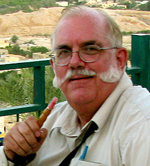Dr. Donald Whitcomb
Khirbat al-Mafjar is located north of Jericho in the Palestinian territories. Famed as one of the most important "desert castles" of the early Islamic period, the site was first excavated from 1934 to 1948. These excavations revealed a palace and great bath, both of which were intensively decorated with fine mosaics and elaborate stucco figures, as well as stone sculpture and frescoes, placing Mafjar as one of the most important sites in Islamic archaeology.
The Jericho Mafjar Project (JMP) is the first joint Palestinian-American archaeological excavation, making it a unique milestone for scholarship. The first excavators at Mafjar had assumed that the site, a nexus of power for the Umayyad dynasty, was used only during the 8th century A.D. and subsequently abandoned. However, Dr. Don Whitcomb of the Oriental Institute, through research and sequencing of pottery found at the site, pioneered of the theory that Mafjar was actually occupied much longer — well into the 13th century A.D. In 2006, after 60 years of the site being inactive, a survey by Dr. Hamdan Taha, director of the Palestinian Department of Archaeology, proved Dr. Whitcomb correct.
Now, new excavations under the direction of Dr. Whitcomb in the northern areas of Mafjar will investigate the theory that the site was not just a palace complex, but was instead an incipient Islamic city. A second aspect of this new research will examine the relationship of Mafjar to Jericho: Dr. Iman Saca of St. Xavier College will add a focus on community archaeology as a way to involve the people of modern Jericho in the exploration of their own cultural heritage.
Further Information on Adopting the Jericho-Mafjar Project
For more information, visit the Jericho Mafjar Project website.
The Oriental Institute is proud to present this unique project. Archaeology of ancient civilizations transcends current political boundaries, and we hope to contribute to the shared cultural knowledge of the Middle East by supporting the JMP. As a new field project, a variety of tools are needed to make it a success: vehicles, surveying equipment, GPS systems, computers, airfare, and salaries for local excavators. Funding from dig adopters like you can help Dr. Whitcomb and the Oriental Institute start this ground-breaking project, literally and figuratively.
Donald Whitcomb has directed the program in Islamic Archaeology for the University of Chicago's Department of Near Eastern Languages and Civilizations. He began his fieldwork in Iran and continued research on Islamic sites in Oman and Saudi Arabia, also directing excavations at Quseir al-Qadim on the Red Sea coast of Egypt, at Luxor in Egypt, at Qinnasrin in Syria, and at Aqaba in Jordan. Don's research focuses on the development of the Islamic city from its beginnings in the 7th century through the Early Islamic period into the 13th century. He has most recently written the entry on "Archaeology" for the Encyclopedia of Islam.
To schedule your five-year pledge commitment, call the Director of Development, at 773.702.5062, or send an email to: oi-development@uchicago.edu


